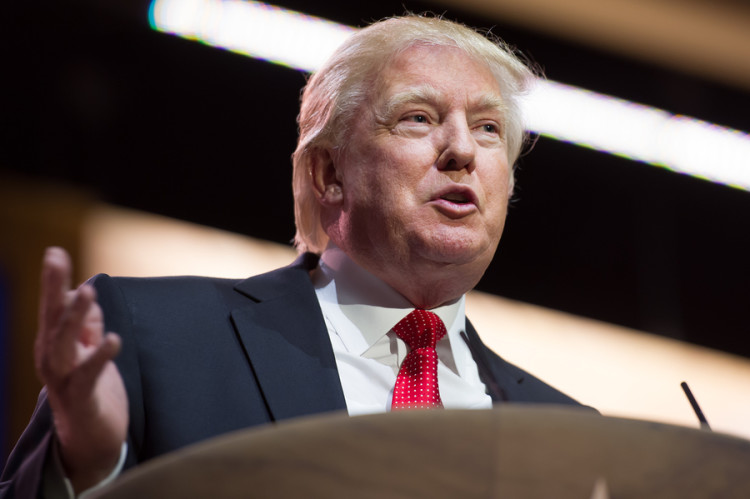Trump and Clinton’s Convention Showdown Hinges on 11 Little Words

published Jul 26th 2016, 4:07 pm, by Adam Tiouririne and Andre Tartar
(Bloomberg) —
“I alone can fix it,” Donald Trump declared on the final night of the Republican National Convention in last Thursday. Hillary Clinton’s challenge—and opportunity—this Thursday is to deliver a more “we”-focused convention speech than her Republican rival. Judging from the past 40 years of presidential history, the candidate whose speech is more about “us” and less about “me” will likely go on to win in November.
A Bloomberg Politics study of convention speeches dating back to 1976, the first time both parties held nationwide primaries and caucuses, shows that the electorate ultimately favors those candidates who use more “we” words—we, us, our, ours, ourselves, and let’s—relative to “me” words—I, me, my, mine, and myself. In nine of 10 elections since 1976, the nominee who notched a higher “we”-per-“me”-word score in his convention speech went on to win the White House. The sole exception was 1988, when George H. W. Bush won the presidency despite delivering a more self-focused convention speech than his Democratic rival, Michael Dukakis.
With 202 “we” words and 141 “me” words in his speech on Thursday, Trump set the mark for his Democratic rival, with a 1.43 “we”-to-“me” ratio—about halfway between Barack Obama and Mitt Romney’s 2012 scores.
A brief history of “we” and “me” in convention speeches
In Ronald Reagan’s speech at the 1984 Republican National Convention in Dallas, the “Great Communicator” used “we” at every opportunity—even the “royal we” at one point, as when discussing his experience on the campaign trail, where a “me” word would have sufficed—dropping a whopping 211 “we” words and just 34 “me” words during his speech.
Yes, the Gipper also uttered “make America great again,” a phrase that’s made a strong comeback this year. More importantly, Reagan delivered a general-election message that ultimately won him 525 electoral votes and four more years in the White House.
That’s because “we” words inspire confidence in others. In one psychology experiment conducted by a team of university researchers from Texas, Memphis, and Seoul, South Korea, pairs of complete strangers held brief online conversations during which they had to complete a task together, then evaluated how much power they held in the interaction, relative to their partner. The people rated as more powerful by their partners after the conversation were also the people who used more “we” words and fewer “me” words. Another study found that patients perceive medical advice as less expert and trustworthy when it’s handed out with more “me” words.
In addition to inspiring confidence in others, “we” words also reflect the speaker’s own self-assurance and level of responsibility. In a study of cockpit communications, high-ranking members of the flight crew used more “we” words while lower-ranking crew members used more “me” words. The same pattern exists in e-mails among office workers of differing seniority.
A look back at the 1976 Democratic National Convention in New York shows a visibly confident Jimmy Carter, whose acceptance speech was the culmination of his own Trump-like populist ascendancy over the Democratic establishment of the day. Carter closed his speech, as most modern candidates do, with a rousing agenda for America.
Four years later, Carter faced a weak economy and a divided party. This time around, he ended his speech with a very similar closing crescendo, with one big difference: Carter’s original “we can” gave way to “I want.”
Where he’d first allied with his audience—“We can have an America … We can have it, and we’re going to have it!”—he now pleaded with them. “I still want the same thing that all of you want … I need for all of you to join me,” he beseeched the convention hall. Victory in 1976 gave way to defeat in 1980.
Finally, fast forward to 2008, when the “Yes We Can” campaign of then-Senator Barack Obama faced off against the “Country First” campaign of John McCain. When it came to convention time, Obama’s inclusive slogan heralded a flood of “we” words, in contrast to McCain’s more “me”-focused recitation of his long record.
Four years later, Obama would again beat his Republican rival in the convention-pronoun stakes—and at the polls on Election Day.
The 2016 scores so far
As Clinton huddles with her speechwriters in the coming days, a comparison of announcement speeches, debate performances and June 7 primary victory speeches reveals an opportunity for her to build on an existing “we”-per-“me” lead against Trump.
That’s not to say that Clinton will necessarily have an easier time selling an inclusive vision to a Democratic Party still mending from a hard-fought primary cycle than will Trump, whose Republican party was visibly fractured in Cleveland leading up to his Thursday acceptance speech. Tracking all the candidates in the 2016 primary debates actually shows that Clinton’s “we”-per-“me” edge carries an asterisk. She narrowly bests Trump, but together the eventual nominees scored dead last among all major 2016 presidential candidates in terms of how many “we” words they used for every “me” word. Combined, they referred to themselves 4,569 times and used the more inclusive “we” words only 2,840 times.
The disparity is partly due to a front-runner effect, in which Clinton and Trump faced more attacks, and therefore often had to defend themselves rather than focus on their platform. (The same effect explains why their closest challengers, Ted Cruz and Bernie Sanders, also rank near the bottom.) Given Clinton’s urgent need to unify her party for the general election, this difficulty in getting to “we” raises the stakes for this week’s riposte to Trump.
But conventions are not like debates. There are no pesky moderators or hectoring rivals, only a podium, a prompter, and an audience of millions. This Thursday, it’s entirely up to Clinton what message—and which pronouns—she shares with the nation.
—Bloomberg contributor Adam Tiouririne of Logos Consulting Group advises senior business leaders on high-stakes communication and researches language, leadership, and the media.
(Adds analysis of Trump speech to paragraphs 1, 3.)
To contact the authors of this story: Andre Tartar in New York at atartar@bloomberg.net To contact the editor responsible for this story: Kelly Bare at kbare1@bloomberg.net David Knowles
copyright
© 2016 Bloomberg L.P







No Comment